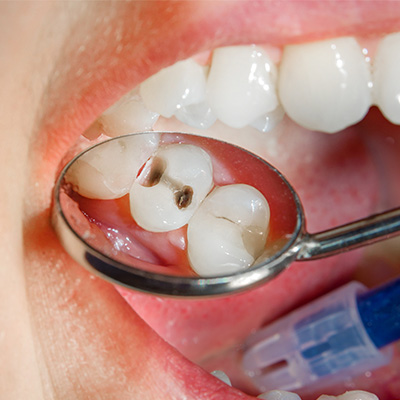Diabetes
Are you diabetic? Did you know your diabetes has an incident on your oral health?
At the same time, your mouth has an incidence on your diabetes balance.
Why does diabetes increase the risk of oral disease?
Different modifications arise in your mouth if you are diabetic. These modifications increase the probability of oral issues.
his is due to a decrease in the amount of saliva, which can also become more viscus. Saliva cannot act as the natural barrier against plaque which will deposit in greater quantity on the teeth. The dry-mouth is more prevalent during hyperglycaemia.
Yet , sugar + dental plaque = acidity. Acidity destroys the hard tissues of the tooth which naturally increases the risk of tooth decay and cavities. The presence of sugar also encourages the presence of other micro-organisms, such as fungi (risk of fungal infection of the mucosa).
This will make you more at risk to infections, such as gingivitis (inflammation of the gum) and periodontitis (tooth loosening due to an inflammation of the gum and supporting tissues of the teeth, also known as gum disease). Periodontitis is the 6th complication in diabetes. People with diabetes also loose the collagen in the gums; such accelerating the destruction of the periodontium.
Furthermore, diabetes causes an inflammation of the blood vessels which in turn will diminish the blood flow in the capillaries of the gum. This decrease in blood flow is damaging for the gums nutrition and delays healing: you heal slower. This explains why periodontitis will progress faster as a diabetic, and why it is more difficult to control.
Request a dental check-up
MAKE AN APPOINTMENT
How can oral disease affect my diabetes?
Oral infection can affect your sugar levels. This in turn will increase your risk of developing or aggravating any oral infections. It’s truly a vicious circle!
An untreated cavity, an infected gum are open doors to bacteria. The bacteria present in your mouth will travel towards your blood system and infect other organs that are at distance of your mouth and cause serious infections.

What extra precautions at the dentist
If your diabetes is not under control, certain precautions need to be taken prior to any dental treatment or even a scale and polish.
The dentist will prescribe a prophylactic antibiotic in unique dose to be taken 1 hour prior to your appointment. As said earlier diabetes has an effect on the healing of the tissues and increases the risk of infection. The antibiotic taken just prior to the dental care will protect you from bacteraemia, which is the presence of bacteria in the blood system.







